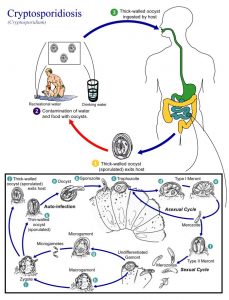By NewsDesk @infectiousdiseasenews
The number of cryptosporidiosis cases reported in Pasco County, FL during the first half of 2019 is nearly what was seen in all of last year, prompting the Florida Department of Health in Pasco County (DOH-Pasco) to ask the public to take caution in swimming pools and water playgrounds.

Cryptosporidium is a microscopic parasite that causes a diarrheal illness. Common symptoms include: diarrhea, stomach cramps or pain, dehydration (which is often most serious in the very young and the very old), nausea, vomiting, fever and weightloss. Symptoms usually begin 2 to 10 days after infection and normally last for one to two weeks. Once a person is infected, the parasites live in the intestines and are passed in the stool.
In 2014, Pasco County had 142 reported cases of Crypto. As of mid-June this year, there have been 10 cases reported, compared to 12 cases reported in all of 2018.
Residents and visitors are advised to practice proper hand hygiene and avoid swimming pools, water playgrounds and water parks when ill with diarrhea. Those who are sick with a diarrheal illness should wait at least two weeks after they have recovered before visiting a public area where they will be exposed to recreational water.
Parents and caregivers should also follow these steps to avoid Crypto:
- Take children on frequent bathroom breaks and check diapers
- Change diapers in a bathroom and not at the poolside, as germs can spread to surfaces or objects in and around the pool and spread
- Shower before entering the water.
- Wash your hands with soap and water after changing a child’s
Those who develop symptoms of Crypto and other gastrointestinal illnesses should contact their health care provider.
- Norovirus sickens dozens in outbreak linked to bar drinks
- New Zealand syphilis cases rise, concern over congenital syphilis
- Crypto: Pinellas County health officials caution public
- France has the lowest levels of trust in vaccines globally
- Invasive Group A streptococcus outbreak reported in Essex, England
- Kansas State University researchers develop model that predicted Ebola spread in Uganda
- Alzheimer’s disease and dementia research updates


